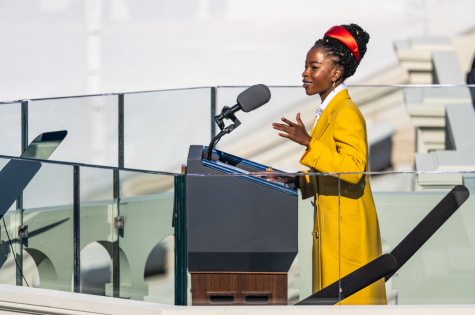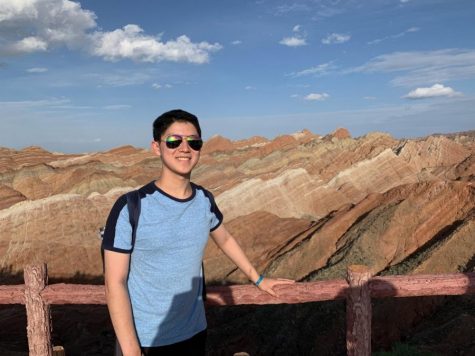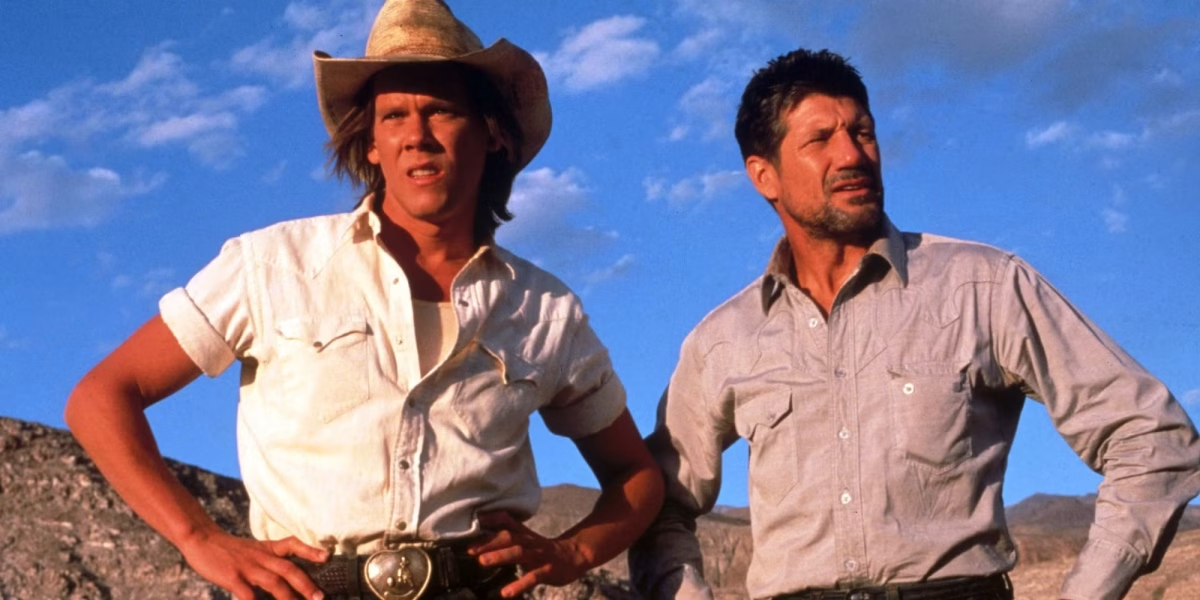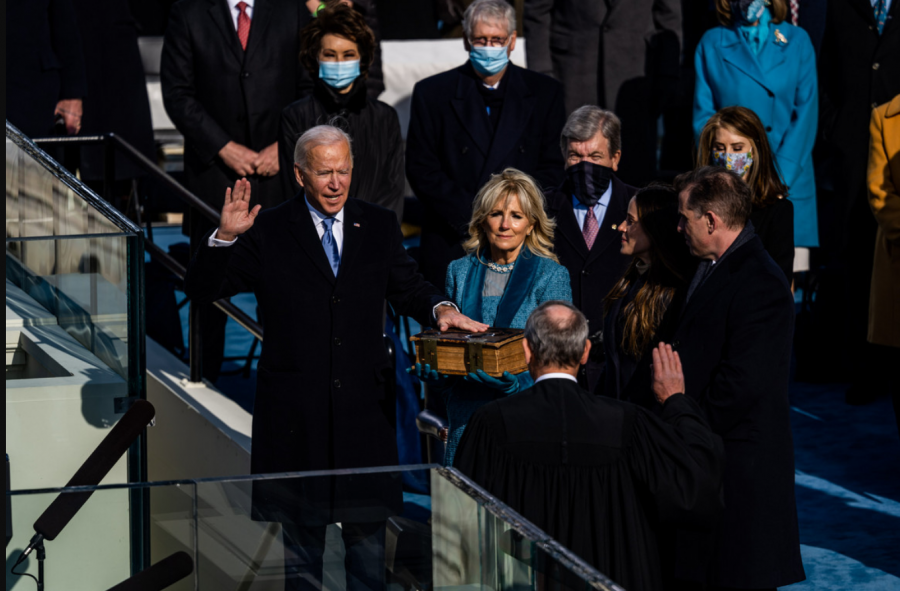Indivisible Inauguration: Biden Meets the Moment with Call for Unity Above All
Joseph R. Biden (left), accompanied by his wife Jill Biden (center) is sworn in as the 46th President of the United States by Chief Justice John Roberts (right). In his inaugural address, Biden tirelessly stressed the need for unity in America, calling on the people of the nation to band together in the face of unprecedented challenges occurring simultaneously. Photo credits: Stephen Voss for Politico.
Joseph R. Biden was inaugurated as the 46th president of the United States of America at noon on January 20, 2021, and the inaugural address he delivered was striking. There was no soaring rhetoric, no “the only thing we have to fear itself”, spoken by Franklin Roosevelt during the darkest hour of the Great Depression; no “ask not what your country can do for you”, spoken by Kennedy at the height of the Cold War; not even an “American carnage”, spoken by Trump four years earlier to a nation still half-numb in shock at its greatest electoral upset in history. But if it had, it would not have been Biden’s speech. In a 20-minute long speech, delivered with conviction but tempered with restraint, Biden plainly and directed spoke to the American people, urging unity after years of division.
It was a uniquely Biden speech, filled with straightforward, unadorned language: “We have never, ever, ever failed in America when we have acted together”, he declared at one point, gesturing forcefully with each “ever”. He repeated the campaign slogan which had carried him through the contentious Democratic primary and bloody general election, pledging to “restore the soul and to secure the future of America” At one point, recounting how “many Americans view the future with some fear and trepidation”, Biden simply said, “I get it”.
While Biden’s simple speaking style has prompted its fair share of snickering from Washington’s sleek politicos, used to glib caresses from silver-tongued senators, it fundamentally met the moment, cutting straight to the heart of the issue plaguing American democracy: unity. Biden did not dance around the issue looming heavy over the proceedings, the Capitol insurrection which had occurred on the very marble steps he was standing on. Yet he resolved, quoting in part from the Pledge of Allegiance, that “on this hallowed ground where just days ago violence sought to shake this Capitol’s very foundation, we come together as one nation, under God, indivisible, to carry out the peaceful transfer of power as we have for more than two centuries.”
He insisted, with trademark humility, that “today, we celebrate the triumph not of a candidate, but of a cause, the cause of democracy.” Such a sentiment would have been unthinkable from most of his vainglorious predecessors, but Biden was uniquely willing to acknowledge his reliance on the larger societal movements undergirding his victory. He paid homage to the swearing-in of his running mate, Kamala Harris, the first African-American, Asian-American, and female Vice President in history: “Don’t tell me things can’t change,” he said. He called for a moment of silent prayer for “400,000 fellow Americans – mothers and fathers, husbands and wives, sons and daughters, friends, neighbors, and co-workers” who had passed away from the COVID-19 pandemic.
The area where he most clearly framed his address as a rebuttal of Trump was in the area of foreign policy, where Biden vowed to “repair our alliances and engage with the world once again… we will lead not merely by the example of our power but by the power of our example.” Biden, a longtime avowed internationalist in foreign affairs, has long condemned the Trump administration’s habit of alienating democratic allies and expanding ties with dictatorships. Still, throughout the entire speech, Biden made not one mention of either Trump or Obama, his two direct predecessors in office; the former is particularly remarkable, as Biden campaigned extensively in the primary as a successor to Obama-style centrism, and has filled the civil service with Obama administration veterans.
Ultimately, again and again, Biden returned to the call for unity. He described the multitude of trials facing him, from the raging pandemic to racial disparity to the climate crisis, acknowledging “Any one of these would be enough to challenge us in profound ways, but the fact is we face them all at once” and calling for the American people to “step up—All of us.” In closing, he quoted excerpts from Gene Scheer’s “American Anthem” – “Let me know in my heart / When my days are through / America / America / I gave my best to you,” and vowed “Together, we shall write an American story of hope, not fear. Of unity, not division. Of light, not darkness.”

His speech was followed by National Youth Poet Laureate Amanda Gorman’s recitation of her poem, “The Hill We Climb”. Gorman, the youngest inaugural poet ever, joined the ranks of distinguished alumni from Robert Frost to Maya Angelou with a powerful and stirring message echoing Biden’s own: “We lay down our arms / so we can reach out our arms / to one another / We seek harm to none and harmony for all”. She too celebrated the racial progress made: “We the successors of a country and a time / Where a skinny Black girl / descended from slaves and raised by a single mother / can dream of becoming president / only to find herself reciting for one.”
Gorman closed with the same unifying, rallying message that the Biden administration would encompass all Americans: “We will rise from the gold-limbed hills of the west, / we will rise from the windswept northeast / where our forefathers first realized revolution / We will rise from the lake-rimmed cities of the midwestern states, / we will rise from the sunbaked south.” Biden’s inauguration as the 46th president of the United States, in a way, symbolically marks the close of the divisive and hyperpartisan 2010s, marred by partisan gridlock and increasing political chasms between left and right. Let us hope that he will carry forth the same themes of his inaugural address and work to mend that wound, to unite the country as the one nation it is meant to be.

Vincent Jiang is currently a senior at West Morris Central High School and President of Journalism Club. Passionate about global affairs, he enjoys writing...



































